Stay updated with the latest - Click here to follow us on Instagram
Trial and error
Post Beijing,you dont need a rifle-scope to zero in on the one omission that will stand out in any list of Indian shooters heading out for an international challenge: Abhinav Bindra.
Abhinav Bindras recent exclusion from international events has brought Indias selection policies sharply in focus,but the problem has several unexposed layers,finds Kabir Mandrekar
Post Beijing,you dont need a rifle-scope to zero in on the one omission that will stand out in any list of Indian shooters heading out for an international challenge: Abhinav Bindra. The rarest of Indian species,with an individual Olympic gold medal to his name,Bindra was left out of the Commonwealth Championships and two upcoming World Cups for not attending the specified trials. Mass indignation at the exclusion followed,and Bindra who has trained in Germany and followed his own counsel and that of his efficient team of advisors while successfully chasing down the gold medal forced the National Rifle Association of India (NRAI) to consider his scores from training stints abroad for the World Cups.
The path of the pellet from the air-gun to the target should be a pretty straightforward one. Ditto for Bindras demand to be exempted from domestic trials that interfere with his training-programme after his proven glittering credentials. But transparency one-half of transparency-accountability twin virtues demanded from sporting federations is a two-way mirror. From his brighter vantage,Bindra might see the many and haphazardly planned domestic trials as irritants to his London 2012 dreams,but those assigned the job of selecting the entire Indian contingent,as well as shooters who are yet to make a mark internationally,might hold a different view of the ideal way of going about selection. If nothing else,the controversy might just hasten the sports administrators into putting in place a system,agreeable to most,if not all. The face-off,if nothing else,may yield a much-needed precedent.
The counter-questions clouding the seemingly obvious answer to the debate (exempt Elite shooters such as Bindra from domestic trials,and let them choose their own international selection tourneys) are far too many to completely ignore.
1. Who do you include in the Elite shooters list Olympic medallists,world record holders,or all Olympians whove earned the slots having proved themselves?
2. How many times,and for how long,can the Elite shooters seek to be exempted?
3. Which trials are mandatory and which are optional?
4. What is a better indicator for selection current form or proved,past records?
5,And finally,can everyone be kept happy within one uniform system so as to find a permanent solution?
DEEP SLUMBER
According to many top-level shooters,Bindras recent flare-up was no surprise. Suma Shirur world record holder in the 10m air rifle who also suffered the same fate,feels that the federation has been in a deep slumber for the last five years and Bindras outburst was a wake-up call. The bubble that was growing dangerously has burst, she said. But the questions remain.
National coach and vice president of the NRAI,Sunny Thomas,admits that there are drawbacks in the current selection system. According to him,the NRAI should consider international performances of the Elite shooters such as Abhinav Bindra and Rajyavardhan Singh Rathore both Olympic medallists as part of the selection trials,provided they intimate the federation well in advance. Abhinav asked the federation to consider his international scores for the trials of the Commonwealth Championships after the team was already announced. We could not drop a single shooter from the team as they all deserved their places, he says.
But while Thomas talked about Elite athletes,he failed to offer a solution for those who may not have achieved Olympic glory,but have been amongst the worlds best. World record holders such as Gagan Narang and Shirur,too,have hectic schedules to deal with. They,too,have no time to spare between international competitions and domestic trials. Shooters cant be expected to peak all the time,so planning their schedules is the key, says a leading shooter,not wishing to be identified. The pressure of an international event is far greater than that during trials. Temperament can only be judged at the big events,given that we dont exactly have a dozen great shooters of equal calibre, he adds. Shirurs answer is a ranking system that could be adopted by the federation.
RANKING SYSTEM?
According to Shirur,rankings should be on the basis of points earned in tournaments,both domestic and abroad. There should be points allotted for international performances. If you win medals you should secure a higher number of points,and if you make it to the top-eight or the top-ten in the world,you get the highest number of points, she says. She also suggests that high scores in various competitions should be the criterion for earning points because the sport is highly competitive. Rankings can be finalised after adding up these points so that there are no discrepancies in selection.
While giving due credit to domestic trials,Shirur feels the real judgement of a shooters ability can be made only in the international arena. Domestic trials are important,but they should not be the only criterion. They should specifically be for the shooters who do not take part in international competitions,so that they have a chance to secure a place in the team. The trials are a good platform for the juniors,but for international shooters they should act as a second chance in case their results abroad are not good, she says.
Once the ranking system comes into place there is no question of exceptions being made for any shooter. The performances at the international level will decide the ranking of the players abroad and the domestic players will have their domestic competitions to have a chance to improve their ranking.
LOOPHOLES
But Tejaswini Sawant,a young,upcoming talent,sees more than a few disadvantages in judging shooters through that suggested mesh of numbers. According to her,each shooter might not be able to compete in all tournaments,and would therefore lose out on points. More importantly,those who are not participating abroad would be at a huge disadvantage. This system will be unfair on some of the shooters. Each shooter prepares for specific tournaments that he or she wants to take part in. For qualification of the Commonwealth Games,a top shooter need not take part in all the six trials. If I wanted to take part in the world championship and not a world cup,I would take part in select competitions that serve as criteria for the tournament and skip the other events. This means my ranking would suffer. That will be unfair, she says,frowning on what will be a blanketing of the selection process under one ranking-quilt.
CANT BE FOOLPROOF
Thomas,a professor of English besides being the national coach,is as keen on fine-tuning the nuances of selection as he is on presenting a summary solution to the pressing problem. I agree the selection system weve been following is not foolproof. But we are trying to arrive at a method that will give the best results at the top levels. Rankings are a good idea and can be tried out, he says.
When considering the scores for rankings,we need to start counting the total of all qualification scores plus the finals scores rather than the average of scores like we did this time. Totalling it means that even if someone does well in the finals by fluke,the previous good scores are not ignored,which tends to happen when averaging the scores, he says.
Thomas has asked for a programmer from Kazakhstan who could help put in place a ranking system a proposal that will come up at the next Core Group committee meeting. Of course the rankings system will be more favourable to regular shooters on the international circuit,but its tough to definitively find something that will please everyone, he rues.
Another major problem,according to Shirur,is the lack of communication between players and the federation. I feel it is wrong that the best Indian team is not selected for a tournament. But every time the players try and fix the situation,they get distracted from training and it affects the performance. At the same time,we have a voice that needs to be heard,as we are the ones who are in the thick of the action. Liaison officials can act as links between us and the federation,and that would bridge the communication gap, she says.
Since there will be no Olympic quotas from the world cups this year,players are looking forward to medals at the world championships,the Asian Games and the Commonwealth Games. The trials issue needs to be sorted out for these tournaments and taking a cue from the world leaders could be a way out. The Europeans have a system much like the one Shirur has talked about. However,in China,selection depends on a trial before every major event.







